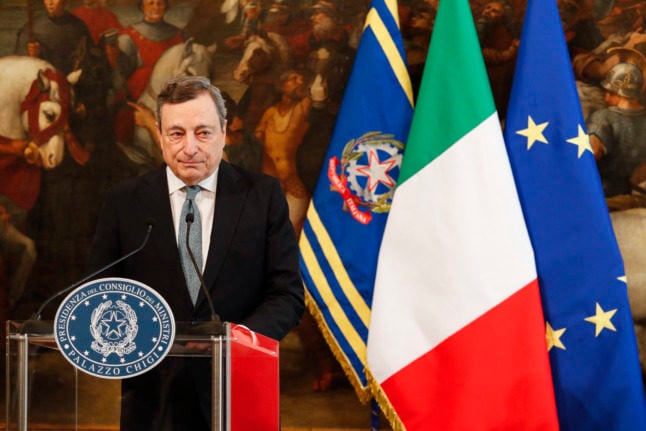Addressing parliament on Tuesday afternoon, Draghi said: “Italy stands ready to take further restrictive measures, should these be necessary.”
“In particular, I have proposed to take further targeted measures against oligarchs. The idea is to create an international public register of those with assets of more than 10 million euros,” he added.
Italy has already contributed financially towards with the emergency, donating €110 million in financial aid to Kyiv.
Draghi’s speech came after the Italian government on Monday passed an emergency decree containing urgent measures in response to Russia’s invasion of Ukraine.
The government on Monday voted in favour of providing military equipment and materials to Ukraine to assist in its defence against Russia’s invasion.
Cabinet ministers sanctioned “the transfer of military means, material and equipment to the governmental authorities of Ukraine”, a spokesman for Draghi’s office said.
Draghi also spoke of the impending refugee crisis as hundreds of thousands of displaced Ukrainians have already fled their homeland and seek protection in neighbouring countries.
“We are working to open special corridors for orphaned children, to allow them to safely reach our country as quickly as possible,” he confirmed.
The prime minister reiterated his country’s stance on providing military assistance and equipment, while reassuring the Italian public that “the government is working non-stop to counter the possible repercussions for our country”.
At the same time, Draghi did not shy away from underscoring Italy’s intention to play an active role in the defence of Ukraine, adding, “Italy does not intend to look the other way.”
The prime minister also said the international community should “intensify further the pressure on Russia’s central bank”.
The European Union on Monday added top Kremlin-linked oligarchs and President Vladimir Putin’s spokesman to its sanctions blacklist.
More sweeping measures, including prohibiting transactions with Russia’s central bank, have helped plunge the Russian economy into turmoil.
The BIS, dubbed the central bank for central banks, acts as a neutral space where central bankers can meet and discuss monetary policy issues.
On Monday, BIS spokeswoman Jill Forden said it would follow sanctions and not be an avenue for sanctions “to be circumvented”.
Draghi hailed the EU’s “prompt, firm, rapid, strong and above all united” response to the conflict.
“Perhaps Putin saw us as impotent, saw us as divided, as drunk on our own wealth. He was wrong,” the premier said.
“We have been and we will be ready to react, to fight back… to defend our values.”
Draghi repeated his government’s advice that Italians in Kyiv should leave and exercise “maximum caution”.
He said Italian embassy staff had moved to the ambassador’s residence together with a group of Italians, including children.



 Please whitelist us to continue reading.
Please whitelist us to continue reading.
Member comments